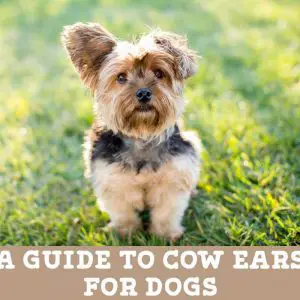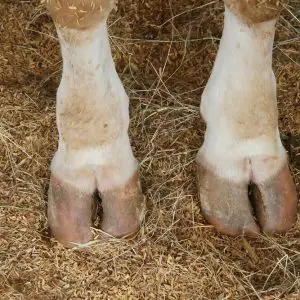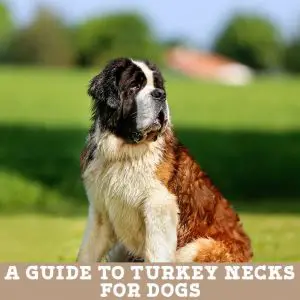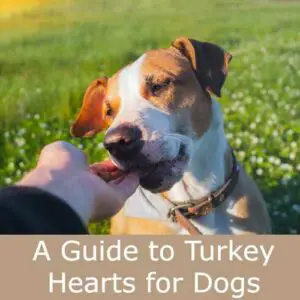Turkey hearts are a less well-known snack for dogs. They are full of protein and have lots of other benefits too. Are they safe to be fed as a frequent treat to your dog? What exactly are these health benefits? This article discusses the pros and cons of feeding turkey hearts as a treat for your dog and will allow you to decide if they are suitable for your dog.
Key facts
Turkey heart treats can be fed fresh as raw hearts, either chopped up or fed whole. Dehydrated turkey hearts are also available. Turkey heart treats are a natural product with no preservatives or additives.
Turkey heart treats are a nutrient-dense snack which are high in protein and low in fat.
Turkey heart treats may aid in improving your dog’s dental health. Turkey heart treats provide valuable mental stimulation for dogs by encouraging the healthy habit of recreational chewing.
Turkey heart treats are relatively low in calories compared to other dog treats currently available. It is important to bear in mind that any additional treats given to your dog can contribute to unnecessary weight gain.
Risks of feeding turkey heart treats include choking, bacterial contamination, digestive irritation and gastrointestinal blockages.
Some popular alternatives to turkey hearts include other animal hearts such as beef, chicken or lamb, dental chews and turkey jerky.
What Are Turkey Heart Treats?
Turkey hearts are, as described, the heart organ removed from the bird. The heart is sometimes viewed as offal or off-cuts of meat as it is not always consumed by humans. Most turkey heart treats come from human-grade quality turkey.
Turkey hearts are 100% natural, and usually free from additives, preservatives and fillers. This means they are a biologically appropriate treat and are easily digestible.
They are suitable for all breeds of dog, and all ages and sizes. They are nutrient-dense and contain good-quality protein while being naturally lean.
Provenance
Turkey hearts can be presented fresh or dried to dogs. They are made from the organ meat of turkeys. They are cheaper than some of the other chew products available due to the fact that turkey heart is often viewed as off-cut.
This is due to the fact it is not a popular option for humans. The UK produces a high amount of turkey meat. It is rarely imported in this country, most of the major supermarkets source their turkey from British farms. The biggest producer of turkey in the UK is Bernard Matthews Turkey Farm.
When choosing a turkey heart product for your dog, always try to source as locally as possible. Remember that animal welfare standards vary greatly from country to country. Try to source products that have been approved by at least one of the following –
Scottish Organic Producers Association.
Preparation
Turkey hearts can be bought frozen to defrost at home, freeze-dried, fresh, or dehydrated. They are usually fed whole to dogs, but they can be cut up into smaller pieces with ease. The size of the treat does vary depending on the size, overall health and nutrition of the bird. If dehydrated, the method used does slightly affect the size of the treat too. A typical turkey heart is approximately 5-6 cm long and 3-4 cm wide.
Raw Feeding
Did you know?
Turkey hearts, whether raw, freeze dried or dehydrated are all classed as raw food. Therefore if you are feeding your dog a raw diet, it is safe to incorporate turkey hearts into their feeding regime. As with all raw food products, there are specific precautions that need to be taken. All raw food comes with a risk of contamination by certain bacteria – these include Campylobacter, Listeria, E coli and salmonella.
The bacteria won’t necessarily cause disease in your dog as they are usually not affected by these pathogens, however, if there is anyone vulnerable in your household, they are at risk of developing serious disease. This includes young infants, the elderly and anyone immunosuppressed. It is recommended to keep up strict hygiene practices including washing hands after handling and cleaning all utensils and surfaces with an appropriate cleaning product.
Benefits of Turkey Hearts for Dogs
Key benefits
Mental Stimulation
Turkey hearts encourage healthy chewing habits which keep your dog occupied and are believed to reduce stress.
Oral and Dental Health
Healthy chewing habits may aid in the removal of plaque and tartar from your dog’s teeth.
Nutritional Benefits
Turkey heart is a low-fat, high-protein snack with various different vitamins and minerals which are important for your dog’s health.
Hypoallergenic
Turkey hearts contain 100% turkey meat and no other source of protein, so as long as your dog is not allergic to turkey, it will be safe to feed them this treat.
Mental Stimulation
When our dogs chew on treats such as turkey hearts, this provides huge enjoyment for our dogs. It does this by causing the natural release of serotonin and dopamine. These are two important neurotransmitters in the brain responsible for good mental health and happy or content feelings for our dogs.
Feeding turkey heart can help to encourage healthy recreational chewing habits. Dogs learn how to hunt and scavenge for food by chewing when they are youngsters. It is important that they have some sort of enrichment that allows them to carry out this natural behaviour at home in a safe and controlled environment.
It will also save them from chewing things they shouldn’t around the house. Chewing is thought to help with relieving stress in dogs too. Small cut-up pieces of turkey hearts are useful to use as a high-value treat as a positive reward while training your dog.
Nutrition
Turkey hearts are a healthy treat option for your dog. They provide a good source of a variety of important nutrients. This includes zinc, iron, taurine, vitamin B12, vitamin B2, copper, phosphorus, folate and pantothenic acid. Turkey hearts are easily digestible and high in protein while being low in fat.
Dental Health
Chewing dried turkey hearts may be beneficial for teeth as chewing can help to mechanically debride the plaque and tartar away from your dog’s teeth. It also encourages saliva production. This is thought to prevent the formation of cavities and delay tooth decay by removing food particles from the teeth.
There are no current studies confirming that turkey hearts will do these things mentioned, however, it does not mean feeding turkey hearts has no benefits. It is always recommended to clean your dog’s teeth regularly and have frequent visits to the vet for dental health checks.
Hypoallergenic
If your dog suffers from allergies, it can be difficult to ensure your dog is not being exposed to any allergens in dog foods. This is because some dog foods contain traces of lots of different ingredients. If you are feeding turkey hearts, as long as you know that your dog is not allergic to turkey, they are completely safe to feed and will not cause an allergic reaction as they only contain 100% turkey and nothing else.
Nutritional Information for Turkey Hearts
Nutritional Composition of Raw Turkey Hearts
A typical nutritional composition for dehydrated turkey hearts is slightly different:
Nutritional Composition of Dehydrated Turkey Hearts
Note: The percentages may not add up to 100% as they are averages from several data sources. Ranges are given when there is a wide variation between products. Find out more about how we calculate nutritional information >>
The nutritional composition of individual treats will vary greatly depending on the animal before slaughter, the manufacturer, different batches and preserving methods used. Be aware of this when choosing a product for your dog.
Protein – Turkey hearts are a healthy, lean source of protein for dogs. Protein is broken down into amino acids which are essential for lots of important functions within the body including:
- Maintenance of healthy muscles, tendons and ligaments
- Production of enzymes
- Production of hormones
- Maintenance of healthy coat and skin
Young puppies require a high amount of protein to meet their needs while growing. If you are feeding a good quality puppy food it should not be necessary to supplement with additional protein sources. If your dog is suffering from kidney or liver disease consult your vet before adding any treats to their diet as too much protein can be detrimental in some cases.
Fat – Turkey hearts are low in fat. This makes them an ideal treat for dogs that are overweight or struggling with obesity, or if they have a health condition such as diabetes or pancreatitis. Be aware, the amount of fat will vary depending on the individual animal and its condition before slaughter.
Note that feeding any treats in addition to the recommended calorie amount for your dog will result in unwanted weight gain. This in turn can lead to joint disease, cardiovascular health problems and issues with the gastrointestinal tract. Consult your vet before adding any treats to your dog’s diet, especially if they have ongoing health issues.
Vitamins, Minerals & Compounds
Vitamins & Minerals
Zinc – plays a vital role in the maintenance of healthy coat and skin. Contributes to enzyme and hormone function. Supports the immune system.
Iron – Vital for the production of red blood cells.
Taurine – Aids nerve growth and development, and also has important functions in the heart and brain.
Vitamin B2 – Helps with amino acid and carbohydrate metabolism
Vitamin B5 – Also known as pantothenic acid, aids in the maintenance of healthy skin, red blood cell production, digestive tract health and brain function.
Vitamin B9 – also known as folate, is required for metabolic functions such as red blood cell production and DNA synthesis.
Vitamin B12 – vital for the maintenance of a healthy nervous system and also for the formation and growth of red blood cells.
Copper – aids in the production of red blood cells and the absorption of iron.
Phosphorus – Important for the upkeep of healthy teeth and bones. Also plays a role in kidney function regulation.
It is worth noting that despite all of these nutrients being useful and having their benefits, there is no research currently confirming that turkey hearts provide a reliable source of all these nutrients, in adequate amounts, for your dog.
If you are concerned your dog has a nutrient deficiency, it is best to contact your vet to discuss this with them before making additions to their diet. The best way to ensure your dog is getting all of the nutrients they require is to feed them a good quality, complete dog food.
Calories
Do Not Overfeed
Turkey hearts are averagely high in calories. The calorie content does vary depending on the size of the heart and the condition of it. One turkey heart typically contains around 32 calories. This may be a small or large proportion of your dog’s daily calorie requirement.
This depends on factors such as your dog’s breed, weight and activity level. Be aware of your dog’s recommended calorie intake, and feed treats accordingly. If you are unsure, always consult your vet before making changes to your dog’s diet. Be careful not to overfeed your dog with treats. Even if they are low in fat, the calories will still add up.
Feeding Guide
Turkey hearts should be served as a treat or training reward. If feeding the dehydrated form, it is possible to use it as a food topper crumbled onto your dog’s usual food. Dogs should always be supervised when feeding any sort of treats, especially the dried form as there is an increased risk of choking when chewing. Always provide your dog with fresh water while they are eating the treat.
Downsides & Risks of Turkey Hearts for Dogs
Minor Risks
Minor risks when feeding turkey hearts that need to be noted include risk of bacterial contamination, digestive irritation, gastrointestinal obstruction and choking hazards.
Bacterial Contamination
As turkey hearts are raw food, they come with a risk of contamination with potentially harmful bacteria including Campylobacter, E. coli, salmonella, and Listeria.
These bacteria usually don’t cause any issues for your dog, however, they can cause disease in any vulnerable humans living in the household. This includes infants, the elderly and any individual who is immunosuppressed. It is vital that anyone handling the turkey hearts washes their hands thoroughly after any contact and cleans down all utensils and surfaces used.
Digestive Irritation
Some dogs will react if fed too many turkey hearts. Different dogs will have different levels of tolerance. Some dogs may experience vomiting or diarrhoea if fed too many. It may be that some dogs are allergic or just have a low tolerance, each individual dog is different. When starting to feed your dog turkey hearts, feed a small amount initially and slowly introduce more if no adverse effects are seen.
Gastrointestinal Obstruction
This issue is less common in fresh turkey heartsthan the dried form, however, caution still needs to be taken when feeding any treat. If your dog is an avid chewer or gulps their food, they may swallow larger sections of the heart or swallow it whole.
If this happens, on rare occasions some parts of the treat may become lodged in your dog’s gastrointestinal tract and cause an obstruction. If an obstruction is left, your dog will become very poorly and it may lead to further compilations such as strangulation or perforation of the gut. Signs you may notice include:
- Vomiting
- Diarrhoea
- Inappetance
- Abdominal pain
If you have any concerns contact your vet immediately. Always ensure you feed your dog treats that are an appropriate shape and size for their breed. Always allow access to fresh water when feeding these treats.
Choking Hazard
Again, this is more of an issue with dehydrated turkey hearts rather than fresh treats, although all treats can pose a choking hazard. The risk is higher if the treats are an inappropriate size for your dog, or if your dog chews very rapidly and swallows large chunks. Turkey hearts can be chopped up into small segments which are safer to feed and pose less of a choking risk.
Avoid If…
- Your dog has been identified as being allergic to turkey
- Your dog is obese as additional treats will contribute to weight gain
- Your dog is prone to pancreatitis or has diabetes
- Your dog is likely to gulp or chew large sections or swallow the hearts whole
- Your dog has kidney or liver disease
- Your dog is immunosuppressed, for example undergoing chemotherapy treatment
Turkey Hearts for Puppies

The age suitability for feeding turkey hearts to dogs is usually from 12 weeks of age. Depending on the manufacturer and source, the guidance does vary greatly. A whole turkey heart will be very difficult for a puppy with deciduous teeth to bite into and chew so consider cutting up the heart if feeding before their adult teeth have erupted. Turkey hearts can contribute to a large portion of your puppy’s daily allowance of calories so be cautious when feeding and always take into account their calorie intake. If turkey hearts are used too frequently they will contribute to unwanted weight gain and can cause developmental issues for young growing puppies. Dried turkey hearts can provide an interesting texture of chew treat for puppies who will especially enjoy them if they are teething.
Alternatives to Turkey Hearts
- Other heart treats – there are other heart products on the market, these include beef hearts, which are an excellent source of protein and iron. Chicken hearts are smaller and they are a good option if your dog is allergic to turkey. Lamb hearts are very palatable and they also are a good source of protein and contain high amounts of vitamin B12.
- Turkey jerky – Turkey jerky is usually made from turkey breast meat which is high in protein and low in fat. Out of the dried dog treats on the market, it is the most similar to turkey heart as they are both made solely from muscle. Turkey jerky treats tend to be thinner and longer in shape than raw turkey hearts or dehydrated hearts, so may suit different sizes of dogs depending on their chewing habits.
- Dental chews – There are many different dental chews available on the market for dogs. They are normally made from potato starch with flavours added. This puts some owners off as they are not 100% natural. Make sure when choosing a dental chew for your dog that you pick a veterinary-approved brand, the Veterinary Oral Health Council have a useful list on their website. Dental chews can be beneficial for your dog’s oral health but beware they can be highly calorific so be careful not to overfeed.
FAQs
Turkey hearts are very good for dogs. They are low in fat and high in protein. They contain many useful vitamins and minerals and provide a nutritious snack for your dog.
Turkey hearts are safe for dogs. They are a healthy snack and provide many nutritional benefits. There are some minor health risks owners need to be aware of. Turkey hearts can carry some harmful bacteria, they can cause choking and intestinal obstruction and also gastric irritation.
Dogs do like turkey hearts. They are highly palatable and offer an interesting texture and strong flavour. Dogs tend to enjoy turkey hearts and look forward to eating them.
The number of turkey hearts your dog can eat does depend on your dog’s size, breed, activity level plus anything else that affects their metabolism. One turkey heart contains, on average, about 32 calories. Using this information alongside the recommended calorie intake for your dog, you can work out how many they would be able to eat per day.
Fresh turkey hearts can be kept for 2-3 days in the fridge. They can also be frozen and then defrosted for use. They can be safely kept in the freezer for 6 months. Dried turkey hearts have a longer shelf life. Once the packet is opened it is recommended to finish them within 6-8 weeks.
Unfortunately, turkey hearts can cause a blockage. If they are eaten too quickly and large chunks are swallowed, or if they are swallowed whole, they can sometimes get stuck in the gastrointestinal tract of dogs. This is relatively rare but can be very serious if it does occur.
Turkey hearts are not unpleasant to have in the house. Fresh raw turkey hearts can be kept in the fridge just as any other meat products would be. They generally do not have a strong odour detectable by the human nose. Dried turkey hearts may have a slightly stronger smell but if the packet they are in is sealed then it will not be possible to smell.
Turkey hearts can cause diarrhoea in dogs in certain circumstances. Generally, it is rare but they can cause gastrointestinal upset if they are fed too frequently or in large quantities. If your dog is allergic to turkey or has a low tolerance to turkey then feeding turkey hearts may cause signs such as diarrhoea.








